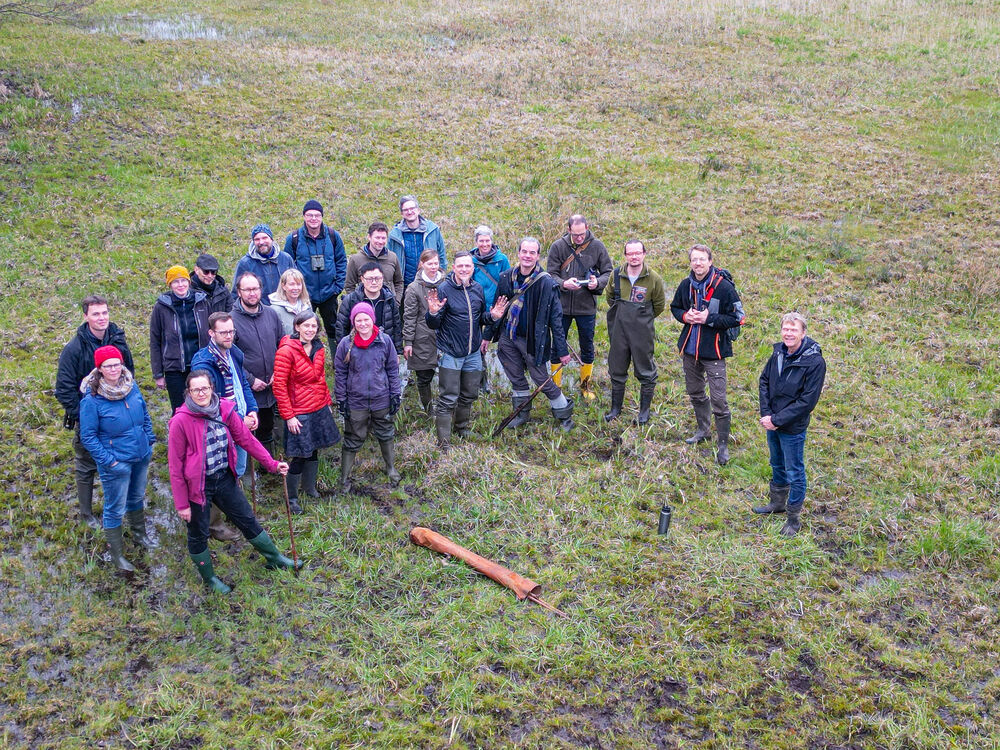Rewetted peatlands not only store carbon, retain nutrients and purify water, they also have a cooling effect on the environment and provide a habitat for specialised species. Peatlands have been drained for centuries, which has led to significant greenhouse gas emissions, nutrient discharge into watercourses and neighbouring ecosystems, as well as a massive loss of biodiversity. Rewetting programmes across Europe now intend to reverse these negative effects. However, this does not restore the original peatlands, instead new types of ecosystems are created. We are yet to fully understand how these novel ecosystems work.
The research network aims to gain a better understanding of the functioning and complex ecological, biogeochemical and hydrological processes in rewetted fens. This should also help to develop specific strategies for the management of these areas and their sustainable utilisation through paludiculture in the long term.
The CRC/Transregio WETSCAPES 2.0 will provide a functional understanding of these new peatland ecosystems and investigate the spatial and temporal effects of peatland rewetting on a landscape scale and beyond. A range of various innovative research approaches will be used:
- Chronosequences: A large number of rewetted peatlands of different ages will be used to analyse long-term chronological developments and the ecological processes involved, for example, regarding the development of new peat layers.
- Central investigation areas: Extensive, detailed field measurements will be carried out on selected peatland areas to gain a fundamental understanding of the ecosystem’s functions. These measurements shall analyse e.g. soil properties, underground and above-ground biomasses, water chemistry, vegetation, microbiology, biogeochemistry and greenhouse gas exchange.
- Experiments on a landscape scale: controlled, experiments on a landscape scale in the two most common kinds of peatland in north-east Germany (percolation mire, coastal flood mire) will make it possible to investigate complex interactions at the landscape level. Rewetted and still drained peatlands belonging to both kinds of mire will be investigated in an extensive measuring programme.
- Mesocosms: Controlled experiments on 108 small, artificial peatlands (“mini-peatlands" in large tubs) will help to decipher specific ecological processes and their dynamics under controlled conditions.
- Process-based modelling will be carried out across all relevant scales and processes and will accompany the empirical and conceptual work of WETSCAPES2.0 from the outset. The process-based models are trained and validated using the empirical data and fed back into the conceptual models and integrative process-based modelling to create a mutual learning framework for all of the approaches. This will make it possible to quantify the effects of rewetting on the environment, climate and land use.
WETSCAPES 2.0 strengthens cutting-edge research in Mecklenburg-Vorpommern and also makes a decisive contribution to addressing global challenges such as climate change and the loss of biodiversity, and advancing nature-based solutions to local problems. The project aims to improve social acceptance of the topic by transferring knowledge and communicating research topics in close cooperation with the Greifswald Mire Centre.
The Collaborative Research Centres (SFB) of the DFG are long-term research units at universities in which researchers work together as part of an interdisciplinary research programme. Collaborative Research Centres enable the realisation of innovative, demanding, complex and long-term projects through the coordination and concentration of people and resources at the applying universities. They serve to establish institutional priorities and structures.
Further information
Greifswald Mire Centre
University of Greifswald
University of Rostock
Images accompanying this media release are available free of charge for editorial purposes in connection with this media release at pressestelleuni-greifswaldde. In the event of publication, the name of the photographer must be mentioned.
Image 1: Researchers belonging to the Wetscapes project in the field. © Florian Jansen
Contact
Prof. Dr. Jürgen Kreyling
Experimental Plant Ecology
Institute of Botany and Landscape Ecology
University of Greifswald, partner in the Greifswald Mire Centre
Soldmannstraße 15, 17489 Greifswald
Tel.: +49 3834 420 4131
juergen.kreylinguni-greifswaldde
Prof. Dr. Nicole Wrage-Mönnig
Professor of Grassland and Fodder Sciences
Faculty of Agricultural and Environmental Sciences
University of Rostock
Tel.: +49 381 498 3140
nicole.wrage-moenniguni-rostockde

